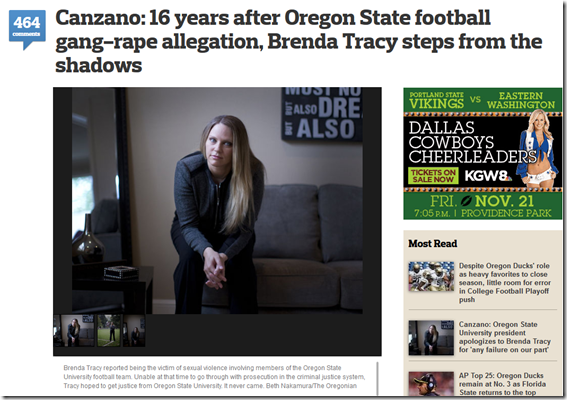Finally: A University Responds To Rape Allegations Well
Brenda Tracy says she was raped 16 years ago by four men, two of whom were Oregon State University (OSU) football players. There was a lot of evidence to substantiate her claim—the men “implicated each other during interviews with police,” and Ms. Tracy “had a thorough rape examination”—but because she chose not to press charges, the four men never faced criminal prosecution.
For the first time since her assault in 1998, Ms. Tracy identified herself publicly last week. In a gripping article written by John Canzano in The Oregonian, she describes being brutally gang raped by the four men over a seven-hour period.
The OSU football coach in 1998, at the time of the incident, was Mike Riley. Back then, he “suspended two of the players for one game and was quoted as saying his players had made, ‘a bad choice.’” Ms. Tracy says that three-word phrase still “burns” her.
Here’s the twist in this case: Mike Riley is still the coach of Oregon State’s football team. But there’s at least some good news in this story. In contrast to other recent high-profile rape (or alleged rape) cases, Coach Riley and OSU’s president responded to the Oregonian report in exactly the right way.
Before proceeding with the rest of this post, let me make clear that the scope of this post includes only the response to last week’s Oregonian article—not Coach Riley’s or OSU’s handling of the case in 1998, which may well have been insufficient.
But Coach Riley was pitch perfect in his response on Friday, leaving the following comment in the Oregonian’s comment section:
And OSU president Edward J. Ray offered a lengthy statement worth reading in its entirety:
“I am sure that many of you have read the article just published on OregonLive and being published in three segments this week in The Oregonian regarding the horrific assault suffered by Brenda Tracy in 1998 at the hands of several men.
I learned the details regarding this assault on Friday. Apparently, statements were taken from Ms. Tracy and the suspects, two of whom were on the Oregon State University football team at the time.
We are told that law enforcement officials in 1998 were not able to bring criminal charges because Ms. Tracy did not wish to participate in a prosecution.
OSU cannot control the criminal justice system, but I have asked university staff to obtain the police reports for the case and to determine if there are any actions we can take now under OSU’s code of student conduct. There may be no formal course of action available to us but we must try. While legal minds could no doubt explain how it makes sense to have a statute of limitations for sexual assault crimes, I find that appalling. Hopefully, justice delayed is not justice entirely denied in this case. We are currently trying to get the facts regarding OSU’s handling of this matter in 1998, including what efforts were made then to reach out to Ms. Tracy to help her deal with the terrible physical and emotional harm she suffered. If a case of this nature was reported to the university today, OSU’s Office of Equity and Inclusion would work to stop the sexual misconduct, assist the survivor and prevent a recurrence.
Ms. Tracy’s journey has been simultaneously heart-breaking and inspiring because of her own capacity to reclaim her sense of self-worth and pursue her education so that she can help others through her work as a nurse.
There is no statute of limitations on compassion or basic human decency. I understand that Mike Riley, who was our football coach at the time, has offered to meet with Ms. Tracy and would like to have her speak with the football team if she wishes to do so. The immediate response from us to Ms. Tracy is to ask how we can help her address the effects of this violence. It is our hope that any role she is willing and interested in pursuing to help educate our community on the horrors of sexual assault by sharing her story could bring some healing.
This would be of great interest to us, but only if it is helpful to Ms. Tracy in continuing to deal with all that she has suffered.
We cannot undo this nightmare. I personally apologize to Ms. Tracy for any failure on our part in 1998 in not helping her through this terrible ordeal. This is a moment from which each of us can learn. But it is mostly a moment for us to help Ms. Tracy heal.”
Wow. Those statements are serious, infused with compassion, and completely victim focused. One wishes that all institutions involved in these types of cases would respond similarly. (That said, it’s worth noting that Mr. Ray’s statement doesn’t mention Coach Riley’s original handling of the case; he may have to address that part of the story if other reporters ask him about it, as I suspect they will.)
Of course, a good crisis communications statement or two doesn’t make up for Ms. Tracy’s 16 years of suffering in near-suicidal silence. But even now, doing the right thing still matters to Ms. Tracy:
“When I told Tracy about OSU’s reaction and Riley’s wish to think about having her speak to his team someday, she broke down. Of course, she’d love to be part of an educational program, not just for the football team but for any group interested in hearing her story.
‘Maybe that’s where this was supposed to go all along,’ she said.
Click here to instantly join our mailing list and receive the best of the blog twice each month.





“NFL Commissioner Edward J. Ray” has a nice ring to it.
Ben Anderson
Anderson Strategies
Ben — I like it! NFL Commissioner Edward Ray would be a nice complement to the NBA’s Adam Silver.
Thanks for reading,
Brad